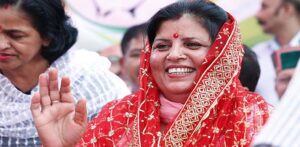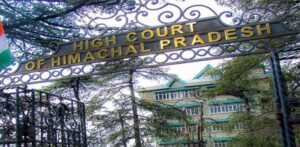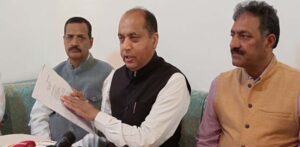As business-driven leaders rise, Himachal’s true political legacy fades

- How US Elections Could Impact and Benefit Indian Hill States Like Himachal - October 31, 2024
- Himachal’s Tourism Future Hinges on Effective Waste Management - October 29, 2024
- Kangra Airport Expansion: First Landowners Compensated - October 22, 2024
Shimla: The scene when sun sets over the snow-capped peaks of Himachal Pradesh, it isn’t just the day drawing to a close — it’s an entire era of politics.
The once vibrant political landscape, dominated by giants like Virbhadra Singh, GS Bali, PK Dhumal and Shanta Kumar, now feels strangely quiet. These leaders, whose towering presence shaped the destiny of the hill state for decades, have exited the scene, leaving behind a political vacuum and a question that echoes in the valleys: Who will lead now?
Final bow of Himachal titans
The journey of Virbhadra Singh, affectionately known as “Raja Saab”, began decades ago when he stepped into the world of politics with the grace and charm that only a royal could possess. His reign over Himachal’s political landscape was like that of a wise king, who knew his people by name and understood their problems intimately. Wherever he went, crowds followed, not just because he was a leader, but because he was one of them. They chanted “Raja Nahi Fakeer Hai”.
When GS Bali, the firebrand from Kangra, spoke, it wasn’t just words—it was a promise to the youth, the unemployed, the struggling. He wasn’t a politician. He was a voice for the voiceless, the everyday man who looked up to him for solutions.
But time, the great leveller, has called these men home. Virbhadra Singh and GS Bali have both left this world, their voices now only echo in the wind, leaving their followers to grapple with their absence.
Also Read:https://thenewzradar.com/identity-cards-likely-to-become-mandatory-for-himachal-street-vendors-committee-reaches-consensus/
Silent departure of Dhumal, Shanta Kumar
While Singh and Bali have passed on, PK Dhumal and Shanta Kumar have quietly stepped away from the political stage. Dhumal, once the face of the BJP in Himachal, was known for his simplicity and unwavering dedication to his party. His rallies were less about grandeur and more about conversations — about the common farmer, the small business owner, the daily wage earner. His presence reassured many that someone was listening.
But as time moved on, and with his son Anurag Thakur rising through the ranks, Dhumal took a step back. He was no longer the face of the BJP, and the crowd that once chanted his name now had newer faces to look at.
Similarly, Shanta Kumar, the principled veteran, whose honesty and simplicity were the bedrock of his political career, now watches the changing tide from afar. The man who once led the state with integrity and wisdom has chosen a quieter life, his influence fading as the new breed of leaders takes center stage.
Rise of business-backed leaders: Different kind of power
As these legends retreat, the political arena is being filled with a new type of leader — one who is as comfortable in a corporate boardroom as in a political rally. These leaders are driven not by the masses, but by business interests, financial strategies, and commercial influence.
Gone are the days when a politician’s strength lay in the number of hands they shook, the houses they visited, and the festivals they attended. Today’s leaders are measured by their business alliances, their financial backers and the strategic partnerships they forge behind the scenes. The connection to the common man seems secondary to the focus on economic clout.
These new politicians, armed with corporate backing, view politics not as a calling, but as a calculated game — where money talks and public interaction is just another box to tick on the campaign trail.
Also Read: https://thenewzradar.com/citing-sardar-patel-vikramaditya-stands-by-his-statements-says-internal-security-matters-most/
Diminishing public connect
The loyalists of Virbhadra Singh, Bali, Dhumal and Shanta Kumar—those who once thrived in the shadow of these giants—are now struggling to find their place. They still remember the old days, where rallies were emotional, where people weren’t just voters, but friends and neighbours. But that connect, that bond, is fraying.
While these second-generation leaders hold positions of power within their respective parties, the crowds aren’t the same, the cheers not as loud. Without the charismatic leadership of their mentors, they are lost in translation — trying to navigate a political world that no longer speaks the same language.
Price of corporate politics
Himachal Pradesh, long known for its heartfelt politics, where leaders were more like family, is now at a crossroads. The rise of business-oriented leaders brings with it a certain efficiency, a promise of development and economic growth. But with that comes a price — the emotional disconnect.
The question now hangs in the air: Can these new leaders, with their business interests and corporate backers, truly understand the soul of Himachal Pradesh ? Can they feel the pulse of the farmer, the artisan, the shopkeeper, the common man who made this state what it is?
Looking Ahead: Will legacy of grassroots leadership return?
As the sun sets on the political legacies of Virbhadra Singh, Bali, Dhumal and Shanta Kumar, the state of Himachal Pradesh stands at a crossroads. The transition from grassroots leadership to corporate-driven politics is undeniable.
The real question is whether the next generation of leaders will remember the lessons of the past—where leadership was about more than money and influence. It was about listening, connecting, and serving.




